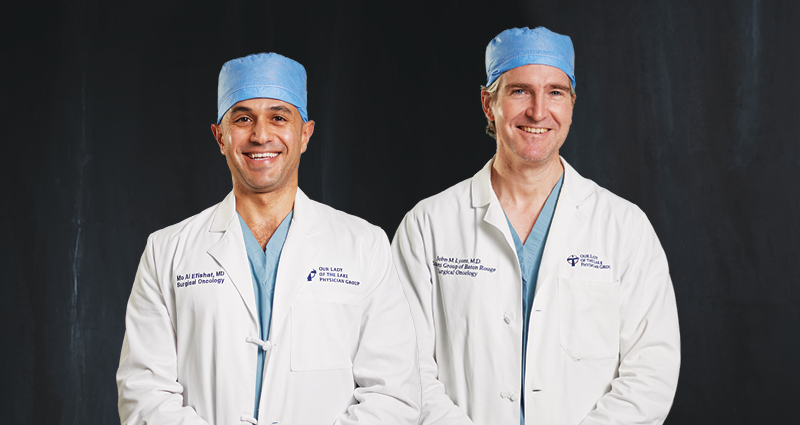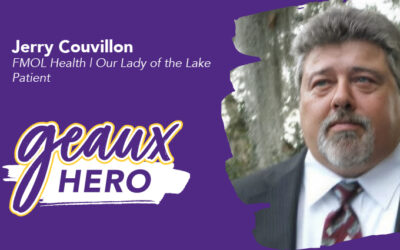In the world of cancer care, surgery can be one of the most hopeful turning points for a patient. It’s where compassion and clinical excellence meet.
That’s the perspective shared by surgical oncologists John Lyons III, MD, FACS, and Mo Al Efishat, MD, FSSO, FACS, who specialize in caring for people with liver, pancreatic and other abdominal cancers.
At Our Lady of the Lake Cancer Institute, excellence in cancer surgery is more than technical skill. It’s personal, collaborative and always moving forward.
What Is Surgical Oncology Anyway?
Not all cancer surgeries are created equal. That’s where surgical oncologists come in. These specialists are trained not just in surgery but in the nuances of cancer biology, staging and how surgery fits into a patient’s overall treatment plan.
Surgical oncologists are adept at managing the nuances of cancer surgery and coordinating with other oncology specialists, such as medical oncologists, radiation oncologists and palliative care providers. This multidisciplinary approach ensures that patients receive comprehensive care tailored to their specific needs, and the level of coordination makes care more convenient and less stressful for patients.
The Power of Team-Based, Individualized Cancer Care
When it comes to cancer surgery, there’s no such thing as one-size-fits-all. That’s why Dr. Lyons and Dr. Mo emphasize individualized treatment plans built through a team approach.
This team model also ensures that patients have access to clinical trials, many of which are offered locally through partnerships with the LSU Health Sciences Center. And those trials are changing the standard of care.
“Clinical trials are important for a number of reasons. They are the engine that drives science,” Dr. Lyons says. It also offers patients access to treatments not otherwise available. “It’s a win-win, and we take it very seriously.”
Screening and Surveillance to Detect Cancer Early
Some of the most exciting progress in cancer care is happening before surgery is ever needed. Screening for liver cancer, for example, has improved significantly.
“Liver cancer is a major problem,” Dr. Lyons says. “We have a rising incidence of hepatitis C in the nation and in Louisiana.”
He emphasizes the importance of early diagnosis.
“We now know that we should be screening anyone with cirrhosis of the liver or chronic liver disease,” Dr. Lyons says. Routine ultrasounds or MRIs can help identify liver tumors when they’re still treatable with surgery.
Pancreatic cysts are another area where surveillance has become critical.
“I’m very passionate about pancreas cysts since I was in training,” Dr. Mo says. “We know that 20 percent of pancreatic cancer actually starts from a cyst.”
Thanks to evolving guidelines, patients with pancreatic cysts now benefit from long-term monitoring with specialized imaging and expert oversight.
“It allows us to intervene when necessary and avoid surgery when we don’t need to do it,” Dr. Mo says.
More than Medicine: Guiding Patients with Clarity and Care
For both surgeons, patient relationships are at the heart of everything they do.
Dr. Lyons says that when patients hear the word “cancer” fear can take over. That’s why he prioritizes compassion and clarity.
“Acknowledging the anxiety that comes with it and being able to allay that is huge,” he says.
Dr. Lyons encourages patients to bring family members to appointments and often repeats information across visits. “You’re not going to remember half of what we told you,” he says. “There’s a lot of information coming fast, and it doesn’t always stick the first time. And that’s understandable.”
Offering hope is a vital part of those conversations.
“If someone’s coming to see a surgeon and you’ve got the opportunity to operate on them, that usually is a big win for people,” Dr. Lyons says. “Being able to tell people who are completely scared out of their mind… ‘No, I think we can remove it, and I think we’ve got a good chance of beating this,’ that’s a huge win.”
Dr. Mo agrees.
“We pretty much deal with patients who are still within the curable phase of their cancer,” he says. “So, in general, the conversations we have are more on the uplifting kind of positive side. That doesn’t mean it’s easy, but you build strong relationships with these patients.”
Those relationships often last for years.
“These are patients who you see multiple times before the surgery,” Dr. Mo says. “Then after they’re discharged, you’re still seeing them. This is honestly one of the major factors that led me to go into surgical oncology.”
Expanding Options for Complex Cancers
Behind every successful surgery is a combination of skill, technology and innovation. At Our Lady of the Lake Cancer Institute, that includes advanced surgeries and procedures that open new doors for patients once considered inoperable.
“We can do these procedures because we have a great team at Our Lady of the Lake,” Dr. Mo says. “These surgeries would not be possible without the effort of the entire team.”
The Appleby procedure can remove tumors that involve major blood vessels without removing the stomach, preserving quality of life for some patients.
“It’s part of our portfolio of management of locally advanced tumors in which we cut the vein or cut the artery and then put it back together,” Dr. Mo says.
The robotic Whipple procedure is another complex surgery for pancreatic cancer that removes part of the pancreas, bile duct and small intestine.
HIPEC, hyperthermic intraperitoneal chemotherapy, is a complex treatment for cancers that have spread in the abdomen.
“After surgically removing visible tumors, we circulate heated chemotherapy throughout the abdomen to kill any microscopic cancer cells that remain,” Dr. Mo says.
It’s an intensive procedure, but for select patients, it offers a real chance for long-term survival. It’s a surgery that requires a lot of time and training, and now it’s able to be offered in Baton Rouge.
Minimally invasive surgery is another major advancement.
Many complex liver and pancreatic cancer surgeries can now be performed through small incisions, which helps patients recover faster.
“We’re excited that we’re becoming more facile with doing very complex surgeries with minimally invasive techniques,” Dr. Mo says. “That helps patients recover and get home faster to be with their loved ones and do the things they love.”
Cancer Surgery Close to Home
Both doctors have trained at world-class institutions and now bring that expertise to Louisiana because they believe high-quality cancer care should be available close to home.
“We’re doing the kind of surgeries here that people used to travel to Houston or New Orleans for,” Dr. Lyons says. “And we’re doing them with the same level of expertise.”
For patients facing cancer, that means access to skilled surgeons, leading-edge treatments and compassionate care right in their own community.




